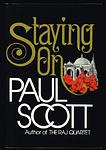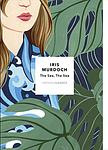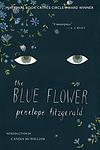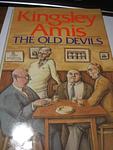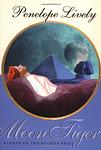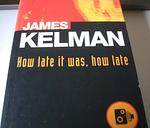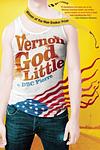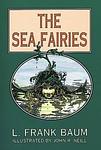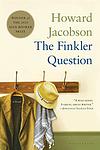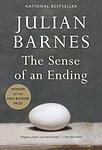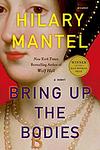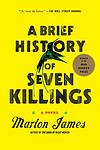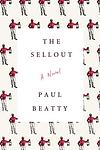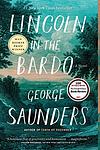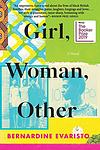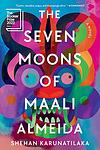Man Booker Prize
This is one of the 280 lists we use to generate our main The Greatest Books list.
-
Something to Answer For by P. H. Newby
Set in 1956 during the Suez Crisis, the novel follows Townrow, a man who travels to Egypt after receiving a mysterious letter stating that his friend Elie has died and left him money. As he navigates through the political tensions and chaos of the time, he suffers a head injury that leaves him with an unreliable memory and perception of reality. As he tries to uncover the truth about Elie's death and his own identity, he gets caught up in the historical events unfolding around him.
-
The Elected Member by Bernice Rubens
The Elected Member is a poignant and darkly humorous novel that delves into the life of a brilliant but troubled man who begins to see silverfish everywhere. His elderly father, a respected Rabbi, struggles to understand and help his son while grappling with his own guilt and the disintegration of their family. The book explores themes of mental illness, addiction, familial relationships, and the complexities of the human psyche.
-
In a Free State by V. S. Naipaul
"In a Free State" is a collection of three short stories and a prologue and epilogue, portraying the realities of post-colonial life and the struggles of individuals caught between their native culture and the imposed Western values. The narratives span across India, Egypt, Washington D.C., and Africa, each exploring the themes of displacement, identity crisis, and cultural conflict. The book provides a profound examination of the human condition, the concept of freedom, and the complexities of power dynamics in a post-colonial world.
-
G. by John Berger
"G." is a historical novel set in Europe at the beginning of the 20th century, tracing the life of its eponymous and mysterious protagonist 'G.' The narrative explores his relationships with women and his experiences during significant historical events such as World War I and the Italian Risorgimento. The book also delves into themes such as sexual and political identity, and the personal impact of broad social changes.
-
The Siege of Krishnapur by J. G. Farrell
Set in India during the period of the British Empire, "The Siege of Krishnapur" is a historical novel that explores the events of the 1857 Sepoy Rebellion. The narrative focuses on the British residents of the fictional town of Krishnapur as they endure a prolonged siege by Indian soldiers. The story delves into the psychological, social, and physical challenges faced by the besieged, and the gradual disintegration of their Victorian-era beliefs and lifestyle. The novel is a commentary on the British Empire, colonialism, and the clash of cultures.
-
The Conservationist by Nadine Gordimer
The book is a character-driven novel set in South Africa during the apartheid era. The protagonist is a wealthy, white industrialist who buys a farm with the intention of using it as a weekend retreat. However, the farm proves to be unprofitable and difficult to manage, and the protagonist's life becomes intertwined with the lives of the black people who live and work on the land. The narrative explores themes of ownership, identity, and the struggle for meaning in a racially divided society.
-
Holiday by Stanley Middleton
"Holiday" is a novel about Edwin Fisher, a man who is dealing with the recent breakdown of his marriage. In an attempt to find solace and clarity, he decides to spend his holiday alone at a seaside town. Throughout his vacation, he interacts with various characters, each of whom contributes to his journey of self-discovery. The novel explores themes of love, loss, and the complexities of human relationships.
-
Heat and Dust by Ruth Prawer Jhabvala
"Heat and Dust" is a novel set in two different time periods in India, exploring themes of colonialism, gender roles, and cultural clash. The story alternates between the 1920s, following the scandalous life of Olivia, an English colonial wife who falls in love with an Indian prince, and the 1970s, where her step-granddaughter journeys to India to uncover the truth about Olivia's life and her own identity. The narrative exposes the complexities of love, culture, and identity in the context of British colonial rule and post-colonial India.
-
Saville by David Storey
Set in a Yorkshire mining town during the Great Depression and World War II, this novel follows the life of Colin Saville, a young boy from a working-class family. His parents sacrifice everything for him to receive a quality education, hoping it will lead to a better life. However, as Colin grows up and navigates the complexities of class, identity, and relationships, he finds himself torn between his humble roots and the intellectual world he's been thrust into. The book explores themes of social mobility, alienation, and the human condition.
-
Staying On by Paul Scott
Staying On focuses on a British couple, Tusker and Lucy Smalley, who decide to stay in India after the end of British rule, rather than return to England. The book explores their struggles and challenges as they try to adapt to a changing India, dealing with the loss of their privileged colonial status, their strained marriage, and their increasing isolation. The narrative delves into themes of ageing, cultural clash, and the end of an era, offering a poignant and complex depiction of post-colonial India.
-
The Sea, The Sea by Iris Murdoch
A successful and renowned London theatre director retires to a secluded house by the sea in an attempt to write his memoirs. His peaceful solitude is disrupted when he encounters his first love from decades ago and becomes obsessed with winning her back. As he spirals into self-delusion and madness, the narrative explores themes of love, obsession, and the subjective nature of reality.
-
Offshore by Penelope Fitzgerald
"Offshore" is a novel that revolves around a group of eccentrics who live on houseboats on the Thames River in London. The story is set in the 1960s and focuses on the daily lives and struggles of these unconventional characters, including a divorced mother of two, a marine painter, a male prostitute, and a retired navy man. The narrative explores themes of community, isolation, and the struggle to maintain a sense of stability in a constantly changing environment.
-
Rites of Passage by William Golding
"Rites of Passage" is a historical novel that explores the journey of a young aristocrat, Edmund Talbot, who is traveling from England to Australia in the early 19th century. The story is told through Talbot's journal entries, which provide a detailed account of life aboard the ship, including the social dynamics, the harsh conditions, and the psychological struggles faced by the passengers and crew. The novel also delves into themes of class, power, and the human condition, culminating in a tragic event that forces Talbot to confront his own prejudices and assumptions.
-
Midnight's Children by Salman Rushdie
The novel tells the story of Saleem Sinai, who was born at the exact moment when India gained its independence. As a result, he shares a mystical connection with other children born at the same time, all of whom possess unique, magical abilities. As Saleem grows up, his life mirrors the political and cultural changes happening in his country, from the partition of India and Pakistan, to the Bangladesh War of Independence. The story is a blend of historical fiction and magical realism, exploring themes of identity, fate, and the power of storytelling.
-
Schindler's List by Thomas Keneally
The book tells the true story of a German businessman who saves more than a thousand Polish Jews during the Holocaust by employing them in his factories. The protagonist's transformation from a greedy high living war profiteer to a savior of lives forms the crux of the narrative. It offers a chilling yet inspiring account of the horrors of the Holocaust, human resilience, and the power of one individual to make a significant difference.
-
Life & Times of Michael K by J M Coetzee
Set in South Africa during a civil war, the novel follows the journey of Michael K, a simple gardener with a cleft lip. When his mother falls ill, he attempts to take her back to her rural birthplace. After she dies en route, Michael continues the journey alone, struggling to survive in a war-torn landscape, while also being caught up in the bureaucratic red tape of the dystopian society. The story explores themes of freedom, survival, and the human spirit's resilience against adversity.
-
Hotel du Lac by Anita Brookner
The novel follows the story of a romance novelist, who, after a love affair with a married man, is sent by her friends to a Swiss hotel to recover. At the hotel, she meets various eccentric characters, including a wealthy woman and her daughter, a mysterious, wealthy man, and a couple on their honeymoon. As she observes and interacts with these characters, she is forced to examine her own life and choices, ultimately deciding whether to accept a marriage proposal from a man she doesn't love or to continue living independently.
-
The Bone People by Keri Hulme
"The Bone People" is a complex, emotional novel that explores the lives of three characters - a reclusive artist, a young mute boy, and his adoptive father - in New Zealand. The narrative delves into themes such as Maori culture, love, violence, and isolation while showcasing the struggle of these individuals as they try to form a family unit despite their personal traumas and societal pressures. The book's unique blend of prose and poetry, along with its blend of English and Maori language, adds to its depth and richness.
-
The Old Devils by Kingsley Amis
The novel focuses on a group of aging friends in Wales who have spent their lives drinking, gossiping, and backstabbing. When an old acquaintance, a successful writer, returns to town with his younger wife, the group's dynamics are thrown into chaos. The story delves into themes of aging, nostalgia, and the complexities of long-term friendships, all with a heavy dose of dark humor.
-
Moon Tiger by Penelope Lively
"Moon Tiger" is a profound exploration of memory and history, narrated by a dying historian, Claudia Hampton, who decides to write a history of the world, but it turns out to be her own history as well. The narrative moves back and forth in time, reflecting Claudia's fragmented memories, and delves into her past relationships, particularly a passionate love affair in Egypt during World War II. The novel explores themes of love, war, the fluidity of time, and the subjective nature of history.
-
Oscar and Lucinda by Peter Carey
"Oscar and Lucinda" is a novel that tells the story of two unconventional individuals, Oscar and Lucinda, who meet on a ship going to Australia in the mid-19th century. Oscar, a young English clergyman, and Lucinda, a teenage Australian heiress, bond over their shared love of gambling. Their mutual obsession leads to a high-stakes wager that will have lasting consequences for both of them. The novel explores themes of love, faith, and obsession against the backdrop of Victorian-era England and Australia.
-
The Remains of the Day by Kazuo Ishiguro
The novel is a poignant tale of an English butler, Stevens, who reflects on his life and career during a road trip through the English countryside. As he delves into his past, he reveals his unquestioning loyalty to his former employer, Lord Darlington, and his unexpressed love for the housekeeper, Miss Kenton. The narrative explores themes of dignity, duty, and regret, as Stevens comes to terms with his unquestioning devotion to his employer and the missed opportunities in his personal life.
-
Possession by A. S. Byatt
"Possession" is a novel that interweaves two storylines, one set in contemporary times and the other in the Victorian era. The contemporary plot follows two academics who uncover a secret love affair between two 19th-century poets, while the Victorian storyline presents the clandestine romance itself. As the modern scholars delve deeper into the past, they find themselves falling in love as well, mirroring the historical romance they are researching. The book explores themes of love, passion, and the power of the written word.
-
The Famished Road by Ben Okri
The novel centers around the life of an abiku, a spirit child, who resides in the bustling city of Lagos. Despite numerous attempts to return to the spiritual world, the boy is tethered to the physical realm through the love of his mother. As he navigates through the political unrest and poverty of post-colonial Nigeria, he experiences a series of surreal and mystical encounters, all while wrestling with the pull of the spirit world. The narrative is a blend of reality and the supernatural, providing a unique perspective on the struggles and complexities of human life.
-
The English Patient by Michael Ondaatje
"The English Patient" is a story of four diverse individuals brought together at an Italian villa during the final days of World War II. The narrative revolves around a severely burned man who can't remember his name or past, a young Canadian nurse who tends to him, a Sikh British Army sapper, and a Canadian thief. As they navigate their own traumas and losses, the past of the mysterious patient slowly unravels, revealing a tale of love, identity, and betrayal.
-
Sacred Hunger by Barry Unsworth
"Sacred Hunger" is a historical novel that explores the Atlantic slave trade in the 18th century. The story follows the journey of a Liverpool merchant's ship, filled with slaves, as it travels from Africa to the Americas. The narrative delves into the harsh realities of the slave trade, the inhuman conditions aboard the ship, and the moral complexities faced by the crew. After a mutiny, the survivors establish a utopian community in Florida, only to face the threat of civilization once again. The novel is a profound examination of greed, power, and the human capacity for cruelty.
-
Paddy Clarke Ha Ha Ha by Roddy Doyle
Set in 1960s Dublin, the novel follows the life of a ten-year-old boy as he navigates through the adventures and trials of childhood. The protagonist's world is one of mischief, discovery, and familial relationships, but as his parents' marriage crumbles, he is forced to deal with adult realities. The narrative is marked by the boy's growing understanding of the world around him, his loss of innocence, and his attempts to keep his family together.
-
How Late It Was, How Late by James Kelman
The novel is a stream-of-consciousness narrative told from the perspective of Sammy, a shoplifter and ex-convict from Glasgow who wakes up in an alley after a two-day drinking binge to find he is completely blind. As Sammy struggles to navigate his new reality, he contends with bureaucratic systems, confronts his past, and grapples with his relationships, all while trying to understand and adjust to his sudden loss of sight. The story is a gritty exploration of working-class life, the human condition, and the nature of reality.
-
The Ghost Road by Pat Barker
"The Ghost Road" is a historical novel set during World War I that follows the experiences of a British army officer undergoing treatment for shell shock at a mental hospital. The narrative alternates between his perspective and that of his psychiatrist, who is fascinated by the psychological effects of war. The novel explores themes of trauma, memory, and the brutal realities of war, while also delving into the psychiatrist's own past experiences with a headhunting tribe in the South Pacific.
-
Last Orders by Graham Swift
"Last Orders" tells the story of four friends who gather to fulfill the final wish of their recently deceased friend: to have his ashes scattered in the sea. As they journey from London to Margate, each man reflects on their shared past, revealing secrets, regrets, and the complex dynamics of their long-standing friendship. The narrative explores themes of loyalty, mortality, and the enduring bonds of friendship.
-
The God of Small Things by Arundhati Roy
This novel is a poignant tale of fraternal twins, a boy and a girl, who navigate through their childhood in Kerala, India, amidst a backdrop of political unrest and societal norms. The story, set in 1969, explores the complexities of their family's history and the tragic events that shape their lives. Their mother's transgression of caste and societal norms by having an affair with an untouchable leads to disastrous consequences, revealing the oppressive nature of the caste system and the destructive power of forbidden love. The novel also delves into themes of postcolonial identity, gender roles, and the lingering effects of trauma.
-
Disgrace by J M Coetzee
"Disgrace" is a novel that explores the life of a middle-aged professor in South Africa who is dismissed from his position after having an affair with a student. After losing his job, he moves to the countryside to live with his daughter, where they experience a violent attack that significantly alters their lives. The story delves into themes of post-apartheid South Africa, racial tension, sexual exploitation, and the struggle for personal redemption.
-
The Blind Assassin by Margaret Atwood
The novel is a complex narrative that weaves together the story of two sisters in early 20th century Canada, one of whom publishes a scandalous novel that leads to her suicide. The surviving sister, now an elderly woman, reflects on their lives, revealing family secrets, heartbreak, and the truth behind the scandalous novel. The narrative is interspersed with excerpts from the controversial book, a science fiction story within a story, adding layers of intrigue and mystery.
-
True History of the Kelly Gang by Peter Carey
This historical novel is a fictionalized account of the life of Australian outlaw Ned Kelly, told in the form of a journal written to his daughter. The narrative explores Kelly's life from childhood, his family's struggles with poverty and the law, his involvement in horse thievery, and his eventual formation of the Kelly Gang. The story culminates with the gang's infamous standoff with the police at Glenrowan, providing a humanizing perspective on a figure often portrayed as a ruthless criminal.
-
Life of Pi by Yann Martel
A young Indian boy named Pi Patel survives a shipwreck and finds himself adrift in the Pacific Ocean on a lifeboat with a Bengal tiger named Richard Parker. Over the course of 227 days, Pi uses his knowledge of animal behavior and survival skills to coexist with the tiger, ultimately leading to an unusual and deeply spiritual journey. The story explores themes of faith, survival, and the interpretation of reality.
-
Vernon God Little by DBC Pierre
The book revolves around the life of a 15-year-old boy, Vernon Little, living in a small town in Texas. After a horrific school shooting where his best friend kills 16 of their classmates before committing suicide, Vernon becomes the prime suspect. With the media and law enforcement on his tail, he attempts to escape to Mexico, resulting in a series of unfortunate events and dark comedic situations. The narrative is a biting satire of America's obsession with fame and the justice system.
-
The Line of Beauty by Alan Hollinghurst
Set in the 1980s during the era of Margaret Thatcher's conservative government in Britain, this novel follows the life of a young gay man named Nick Guest. Coming from a middle-class background, he moves into the home of his wealthy friend's family and becomes infatuated with the opulence and power of the upper class. As he navigates his way through this new world, he also explores his sexuality, all while dealing with the societal and political implications of the AIDS crisis.
-
The Sea by John Banville
"The Sea" is a profound exploration of memory, grief, and loss. The novel follows the story of a widower who returns to a seaside town where he spent his childhood summers. His present-day experiences are interwoven with memories of a transformative event from his youth involving a wealthy family he befriended. As he grapples with the loss of his wife to cancer, he also deals with the haunting memories of the past. The narrative is a deep dive into the human psyche, exploring themes of love, loss, and the fluidity of time.
-
The Inheritance of Loss by Kiran Desai
This novel explores themes of love, loss, and the human struggle for identity amidst political unrest. Set in India during the Nepalese movement for an independent state, the narrative follows the lives of a retired judge living in the Himalayas, his granddaughter, and his cook. As the political situation worsens, each character must grapple with their own personal issues, including the judge's regret over his failed marriage and his granddaughter's struggle to find her place in the world. The cook, meanwhile, dreams of a better life for his son in the United States. The narrative weaves together these individual stories to create a poignant tapestry of human resilience in the face of adversity.
-
The Gathering by Anne Enright
"The Gathering" is a powerful and evocative family saga set in Ireland, exploring the complex dynamics of a large Irish family following the suicide of one of the siblings. The story is narrated by Veronica, the sister of the deceased, who delves into her family's past, uncovering a traumatic event that has shaped their lives. The narrative is a mix of present events, childhood memories, and imagined scenarios, all of which contribute to a profound exploration of memory, truth, and the bonds of family.
-
The White Tiger by Aravind Adiga
"The White Tiger" is a darkly humorous novel set in modern-day India that explores the country's class struggle through the eyes of an ambitious and cunning protagonist. Born in a poor village, he moves to Delhi to work as a chauffeur for a rich family. He eventually breaks free from his life of servitude by committing an act of shocking violence, and uses his newfound freedom to become a successful entrepreneur in Bangalore. The story, told through a series of letters written to the Chinese Premier, is a scathing critique of India's social and economic disparities, and the corruption that permeates all levels of society.
-
Wolf Hall by Hilary Mantel
The novel is a historical fiction set in the 1500s, during the reign of King Henry VIII. The story is told from the perspective of Thomas Cromwell, a man of humble beginnings who rises to become the King's chief minister. The narrative explores the political and religious upheavals of the time, including King Henry's break with the Catholic Church and his controversial marriage to Anne Boleyn. The protagonist's cunning, ambition, and survival instincts are central to the plot as he navigates the treacherous waters of the Tudor court.
-
The Finkler Question: A Novel by Howard Jacobson
The novel explores themes of identity, loss, and love through the lens of three friends - two Jewish and one who wishes he was. It delves into the psyche of the characters as they grapple with anti-Semitism, self-hatred, and their own personal tragedies. The protagonist, a man who starts to believe he is Jewish after a violent mugging, navigates his new identity with humor and introspection, leading to a poignant exploration of what it means to belong.
-
The Sense of an Ending by Julian Barnes
This novel revolves around a middle-aged man, Tony Webster, who is forced to reevaluate his understanding of his past when he unexpectedly receives a lawyer's letter that drags him back into his complex history with his university friends, Adrian and Veronica. The book explores themes of memory, history, and time, showing how our understanding of the past can be distorted by our own perceptions and emotions. As Tony delves into his past, he realizes that his memories may not be as accurate as he once believed, leading to a surprising revelation.
-
Bring Up the Bodies: A Novel by Hilary Mantel
This historical novel continues the story of Thomas Cromwell, advisor to King Henry VIII of England. The narrative follows Cromwell's rise in power and the political machinations that lead to the downfall of Anne Boleyn. It showcases the manipulative and treacherous world of the Tudor court, where a single misstep can lead to disgrace and execution. Despite the danger, Cromwell manages to navigate the treacherous waters, using his intelligence and cunning to survive.
-
The Luminaries by Eleanor Catton
Set during the New Zealand Gold Rush of the 19th century, this novel follows Walter Moody, a prospector who stumbles upon a secret meeting of twelve local men who are trying to solve a series of unsolved crimes. As the story unfolds, it becomes clear that the crimes, which include a rich man's disappearance, a prostitute's attempted suicide, and a huge fortune found in a drunkard's cottage, are all interconnected. The novel's complex narrative structure, which uses astrology to organize its characters and events, adds another layer of intrigue to the story.
-
The Narrow Road to the Deep North by Matsuo Bashō
"The Narrow Road to the Deep North" is a travelogue that depicts the author's journey through the remote and desolate northern regions of Japan. The narrative combines prose and haiku poetry to capture the beauty and spirituality of nature, as well as the author's introspective thoughts and philosophical insights. The journey is not just physical but also spiritual, as the author seeks to understand his place in the world and the essence of the human condition.
-
A Brief History of Seven Killings by Marlon James
"A Brief History of Seven Killings" is a multi-voiced novel that explores the attempted assassination of a world-famous reggae singer and its aftermath. The narrative spans decades, starting from the turbulent 1970s in Jamaica through the crack wars in 1980s New York to the changing world of the 1990s. The story is told from the perspectives of various characters, including gangsters, journalists, and CIA agents, providing a complex and gritty insight into the violent underbelly of Jamaican politics and the far-reaching influence of the drug trade.
-
The Sellout by Paul Beatty
This satirical novel follows the story of an African-American man living in a small, agrarian town on the outskirts of Los Angeles. After his father's death, he attempts to reinstate slavery and segregation in his town as a means of creating a sense of identity for himself and his community. The novel explores themes of racial identity and equality in America, challenging societal norms and expectations through its provocative narrative.
-
Lincoln in the Bardo by George Saunders
The novel is set in a graveyard over the course of a single night and is narrated by a dazzling chorus of voices. The story is centered around the death of President Lincoln's 11-year-old son Willie, who resides in the Bardo, a transitional state between life and rebirth in Tibetan tradition. As Willie interacts with the other spirits stuck in this realm, his father visits the crypt to mourn, causing a struggle among the ghosts over the boy's soul. The narrative explores themes of grief, the impermanence of life, and the unresolved issues that keep us from moving on.
-
Milkman by Anna Burns
Set during The Troubles in Northern Ireland, this novel follows an unnamed 18-year-old protagonist who is pursued by a powerful, older man known only as the Milkman. Despite her attempts to avoid him and maintain a low profile in her community, rumors spread about their supposed affair, leading to increased scrutiny and isolation. The book explores the protagonist's struggle to maintain her individuality amidst political and social turmoil, while also dealing with the pervasive threat of violence and the power of gossip in a close-knit community.
-
The Testaments by Margaret Atwood
This sequel to a dystopian novel set in Gilead, a totalitarian society in what was formerly part of the United States, is narrated by three female characters. The book explores the inner workings of Gilead, its politics, and its eventual downfall. It delves into the lives of the women, their struggles, and their roles in the society, providing a deeper understanding of the oppressive regime. The novel also examines themes of power, resistance, and the ways in which systems of control can be challenged and eventually dismantled.
-
Girl, Woman, Other by Bernardine Evaristo
The novel is a vibrant portrayal of the lives of twelve different characters, primarily black British women, spanning over a century. Each character has their own unique story, tackling issues such as feminism, politics, sexuality, and identity. The narrative is a blend of poetry and prose, exploring the interconnected lives of these women and their personal struggles and triumphs. It is a powerful exploration of race, gender, and the changing face of Britain.
-
Shuggie Bain by Douglas Stuart
"Shuggie Bain" is a heart-wrenching tale set in 1980s Glasgow, Scotland, centered on a young boy, Shuggie, who is struggling with his mother's deteriorating mental health and alcoholism. As he tries to navigate his own burgeoning sexuality in a harsh, unforgiving environment, he also strives to care for his mother, who is trapped in a cycle of addiction and abusive relationships. The book gives a stark portrayal of poverty, addiction, love, and the human spirit's resilience.
-
The Promise by Damon Galgut
This novel delves into the lives of a white South African family over several decades, tracing the country's transition from apartheid to democracy. At the heart of the story is a broken promise made to Salome, a black woman who works for the family, to gift her a house. This unfulfilled commitment serves as a metaphor for the broader societal promises of justice and equity that remain unkept. Through the lens of one family's complex dynamics, betrayals, and secrets, the narrative explores themes of guilt, racial tensions, and the struggle for redemption, reflecting on the challenges of reconciling with the past in a changing South Africa.
-
The Seven Moons Of Maali Almeida by Shehan Karunatilaka
In this darkly satirical novel, the protagonist, a war photographer with a penchant for exposing the brutal truths of his country's civil war, finds himself in the afterlife with no memory of how he died. Set against the backdrop of 1990s Sri Lanka, a nation ravaged by conflict, he is given a week to solve the mystery of his own death and to secure the safety of his carefully documented photographic evidence, which has the power to rock the country. With the help of some eccentric and otherworldly allies, he navigates the complexities of the afterlife, reflecting on themes of corruption, violence, and the cost of silence. The narrative is a compelling mix of humor, horror, and political commentary, offering a unique perspective on the impact of war and the importance of truth.
-
Prophet Song by Paul Lynch
This novel is a gripping tale set in a dystopian future where the world has been ravaged by climate change, leading to societal collapse and the rise of authoritarian regimes. The story follows Isaiah, a young man with a mysterious gift for prophecy, as he embarks on a perilous journey across this desolate landscape. Along the way, he encounters a cast of characters who are struggling to survive and find hope in a world that seems beyond redemption. With lyrical prose and a deep exploration of themes such as power, faith, and resilience, the narrative weaves a compelling vision of humanity's potential for both destruction and redemption.
Man Booker Prize, 57 Books
The Man Booker Prize for Fiction, also known in short as the Booker Prize, is a literary prize awarded each year for the best original full-length novel, written in the English language, by a citizen of either the Commonwealth of Nations, Ireland, or Zimbabwe.[1] The winner of the Booker Prize is generally assured of international renown and success and, for this reason, the prize is of great significance for the book trade.[2] It is also a mark of distinction for authors to be nominated for the Booker longlist or selected for inclusion in the shortlist.
Added about 10 years ago.
This list has a weight of 12%. To learn more about what this means please visit the Rankings page.
Here is a list of what is decreasing the importance of this list:
- List: only covers 1 year (yearly book awards, best of the year, etc)
- List: only covers 1 specific large geographical region (Asia, Latin America, etc)
- Voters: are mostly from a single country/location
- List: only covers 1 specific language
If you think this is incorrect please e-mail us at contact@thegreatestbooks.org.









